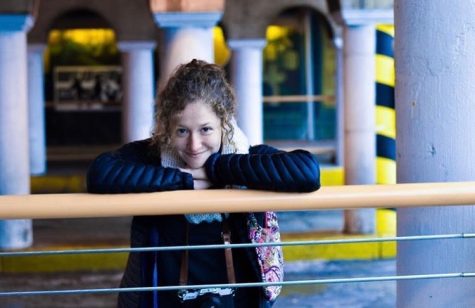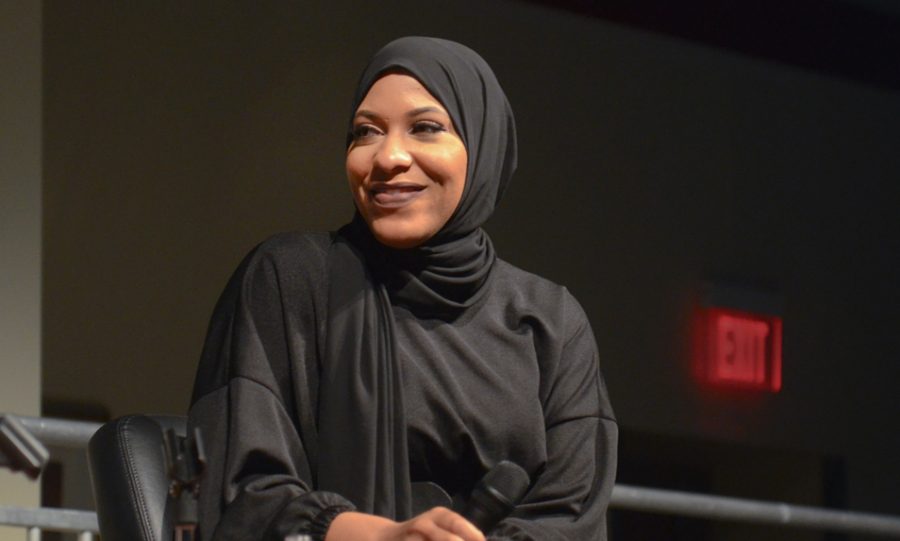Ibtihaj Muhammad Combats Social Norms
Olympic bronze-medal fencer Ibithaj Muhammed answers questions from the audience following her Great Issues speech in the SLU Wool Ballrooms.
Attracted to fencing as a teenager because the sport was conducive to her competing in Islamic dress, 2016 Olympic bronze medalist Ibtihaj Muhammad was hosted by the Great Issues Committee at the Wool Ballrooms on the evening of March 1.
Growing up in a competitive household, Muhammad and her siblings participated in sports starting at a young age as it allowed their parents to keep an eye on them from 3 to 5 p.m. daily. While fencing taught Muhammad much about her mental and physical strength, the sport also allowed her to foster strong relationships with her peers instead of perpetuating the idea that girls and Muslims are not athletic.
After graduating from Duke University in 2007 with dual bachelor’s degrees in international relations and African-American studies, and a minor in Arabic, Muhammad discovered to her surprise that a woman of color had never been on the U.S. Women’s Saber Team. Although she was not ranked in the sport at that time and never participated in a senior competition, she trained to qualify for the national team in order to shatter that status quo.
Her first step was to convince her parents to send her to world cups; they supported her decision.
“I got on this ride and never got off,” Muhammad said. “It was never a goal of mine to qualify for the Olympic team when I embarked on this journey, but what has motivated me throughout different parts of my career was being told no.”
After graduating from Duke, Muhammad told her coaches about her goal of qualifying for the national team – they told her it was impossible.
“They told me that everyone who has been on senior teams has been on teams before,” Muhammad said. She was also older than the typical competitor. The other senior team qualifiers were teenagers, while Muhammad was 21-years-old.
Muhammad was perplexed that her coaches had little confidence in her potential because of her faith and her later start in competing nationally. “That has motivated me throughout my career to challenge the misconceptions that people have – not just about my work ethic and showing people how hard I can work, but also changing and challenging the misconceptions that people have about me as a woman in sport,” she said.
Challenging these misconceptions has become Muhammad’s soundtrack. She questions those who doubt her ability not only for herself, but for other women in sport. After failing to qualify for the London Olympic Games, Muhammad was at a conference, and a little girl came up to her to ask if she was an Olympic fencer. Before she could respond, Muhammad’s friend interjected to say that Muhammad was not an Olympian.
“In that moment, I saw myself in this little girl,” Muhammad said. “She saw me as an Olympian, and I thought that this was something I could do. In that moment, I decided to dedicate my life over the next four years to qualifying for the Olympic team. The decision was born out of proving people wrong and proving to myself that, with hard work, I could do it.”
Muhammad’s Olympic qualification in 2016 came at a paramount time as the presidential election reached its climax. “We as a community of Americans needed to see a Muslim woman in that space,” she said. “There was so much negative rhetoric around the Muslim community from a lot of the presidential candidates to a point where it was becoming normalized.”
By qualifying for the team, Muhammad made a statement, showing the strength and resilience that Muslim women can encompass. She never thought she would bring home an Olympic medal, but she saw both her qualification and the medal as wins, more for the Muslim community than herself.
“I wanted the Olympic team for the little girls out there who had been told they didn’t belong,” Muhammad said. “For people who have been told this isn’t a space that they’re welcomed in, simply because of the color of their skin.”
Regarding situations where individuals are challenged based off of their skin color or religion, Muhammad stressed the importance of remaining true to character. “We will each be challenged in our lives, and someone will make you upset,” she said.
But, combatting these micro aggressions should not be solely a task for minorities. “Minorities need to be vocal,” Muhammad said. “It is just as important, though, for white males to be allies in these moments and to say this is not okay. To be silent in these moments is a crime.”
Your donation will support the student journalists of Saint Louis University.

Staunch entered SLU as a Biomedical Engineering major on a Pre-med track, with the intention of continuing her studies in medical school. After a year and a half at SLU, she realized she missed the balance of the arts with sciences as she was previously an editor in her high school yearbook committee.
"Working for UNews, whether it was as Associate News Editor, Managing Editor, or Editor-in-Chief, has taught me the value of working on tight deadlines and how to adequately adapt to certain unexpected situations. The field of Journalism is incredibly fast paced - but that is why I love it so much," Staunch said. "There is always something new occurring, and you would not be able to effectively complete your job unless you had the support of your other editors and staff."
Though paradoxical in nature, she switched her major to Communication. She wants to incorporate both her analytical and creative sides to report on medical topics. Her dream job: to write for Discover Magazine.
When Staunch is not in the newsroom, she is captaining the women’s Ultimate Frisbee team at SLU. She began playing her freshman year and enjoys it as an outlet.




